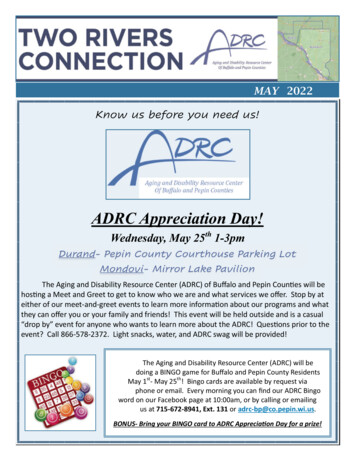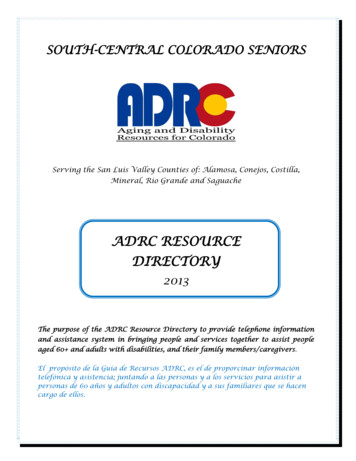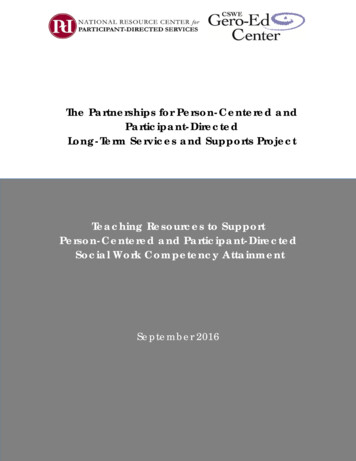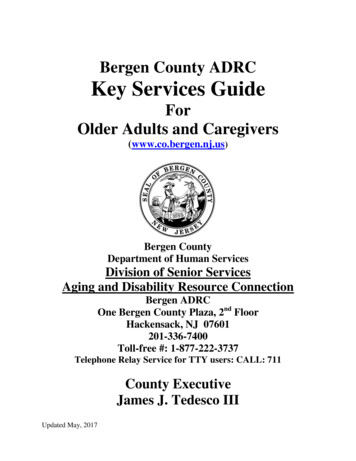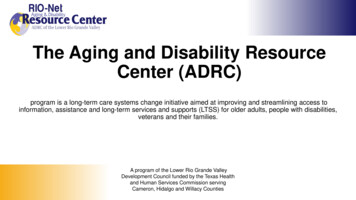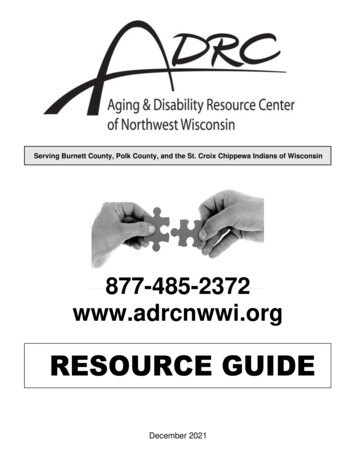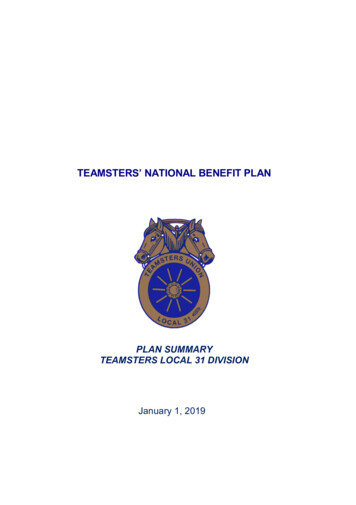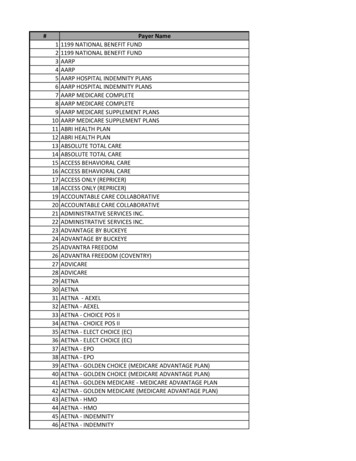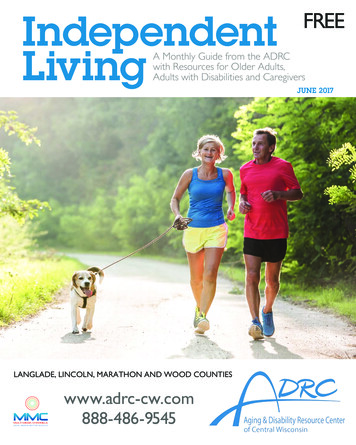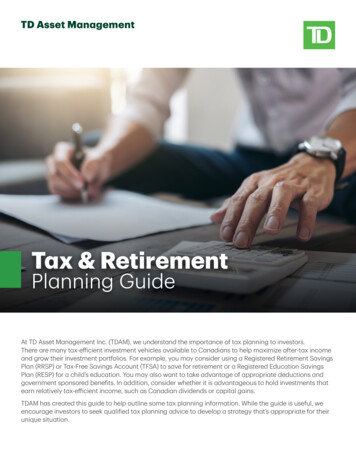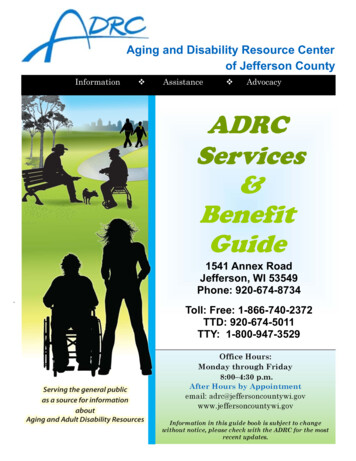
Transcription
Aging and Disability Resource Centerof Jefferson CountyInformation Assistance AdvocacyADRCServices&BenefitGuide1541 Annex RoadJefferson, WI 53549Phone: 920-674-8734Toll: Free: 1-866-740-2372TTD: 920-674-5011TTY: 1-800-947-3529Office Hours:Monday through Friday8:00–4:30 p.m.After Hours by Appointmentemail: vInformation in this guide book is subject to changewithout notice, please check with the ADRC for the mostrecent updates.
Answers and Solutions Start HereAging and Disability Resource Centers (ADRCs) offer the general public a singleentry point for information and assistance on issues affecting older people andpeople with disabilities, regardless of their income. Our resource center is awelcoming and convenient place for you and your family to get informationand access to a wide variety of services. Our Aging and Disability ResourceSpecialists can help you sort through your options so you can make informeddecisions during difficult, often confusing times. We will talk with you wherever itis most convenient—in our office, in your home, over the phone, or by email.WE CAN HELP YOU: Maintain your independence in the communityFind services to help you remain at homeMake plans for your future housing and care needsEvaluate your eligibility for financial benefitsThe Aging & Disability Resource Center is here to provide you withinformation and assistance on a wide variety of topics. Our Aging &Disability Specialists rely on an extensive database that contains up-todate information on many services and resources.To request general information about resources,services or programs available within theJefferson County area, please call 920-674-8734or toll-free 1-866-740-2372 or send an email toadrc@jeffersoncountywi.gov.ADRC’s are available in all Wisconsincounties and 11 tribes.To find an ADRC in your /customer/map/index.htm
Talking with an Aging and Disability Resource Specialistcan help you make more informed decisions about yourLet Us HelpWhether you wouldlike information abouthow you can remain inyour home or move toanassisted living ornursing home facility,the Aging and DisabilityResource Center canhelp you plan services and supports to keep you safeand comfortable.Expert InformationAging & Disability Resource Specialists are experts inknowing housing options and programs available tohelp you get the care you need. Some people require anursing home for a short stay to help with personalcare while recovering from an operation or illness –others may need a long term arrangement due tochronic illness or a disability.Through a pre-admission consultation, people have aconversation with knowledgeable professionals aboutthe options available, information on what to look for ina facility and calculating what you can afford to pay andfor how long. It is very important to assess your present situation and consider all your options beforegiving up your home to enter a long-term care facility.Aging & Disability Resource Specialists can help individuals consider how long personal funds will last and discuss what may happen if money runs out so people canbest plan for their future. The conversation can also include information about the sources of governmentWhat Servicesdo we offer?Information, assistance,and referral for localcommunity services.Counseling on optionsto meet immediate orfuture care needs.Assistance to apply forpublic benefit programssuch as Medicare andMedicaid.Advocacy to cut throughproblems with benefitprograms, healthinsurance, housing, orconsumer issuesLink to help whensomeone is being abused(physically, verbally,or financially) or whensomeone is neglectingtheir own care.Determine eligibility forpublicly funded longterm care programssuch as Family Care,Partnership or IRIS.
Publications available at the ADRCAssisted Living Options in JeffersonDo you have questions about Assisted Living?What assisted living options are available in JeffersonCounty?How do I choose the option best suited to meet my needs?What does it cost and how do I know what I can afford topay?Where can I get information about assisted living andhelp to understand my options?Nursing HomeDo you have questions about nursing home options?How can I determine what my care needs are now and will bein the future?Where can I get information and assistance about long-termcare options?How do I pay for a nursing home & other healthcare expenses?How do I decide which nursing home best meets my needs?What nursing homes are located in my area?Students with Special NeedsIf you are a young adult transitioningfrom the school system and/or children’sprograms to adult programs, the Aging& Disability Resource Center is here tohelp you and your family, to make thattransition as smooth as possible.Transition Roadmap
Are you a caregiver?Families—not institutions—provide the majority of care to their loved one whomay have a disability or have a chronic illness. You are a caregiver if youroutinely provide supervision and/or assistance to another individual who iselderly, disabled, chronically or terminally ill.The Aging and Disability Resource Center (ADRC) of Jefferson County is the firstplace to call to help you learn about community resources that are available toyou. ADRC Staff are very knowledgeable about programs that can help fundservices and educational opportunities to help you care for the people you love.Jefferson County receives financial support through the National FamilyCaregiver Support Program which is designed to provide information, supportand assistance to: Family and friends who help care for a person age 60 and older. Family and friends who help care for a person with Alzheimer's disease orother dementia regardless of age. Grandparents or relative caregivers age 55 who are the primary caregiver fortheir relative's children age 19 or younger, or who are caring for someone witha severe disability who is 19 to 59 years of age. Services available through the National Family Caregiver SupportProgram include: Information to caregivers about available services. Assistance to caregivers in accessing services. Individual counseling, organization of support groups, and caregiver trainingto assist caregivers in making decisions and solving problems related to theircaregiver role. Respite care to enable caregivers to be temporarily relieved from theircaregiving responsibilities, whether their loved one is elderly or a grandchild(supportive home care, chores, personal care). Supplemental services on a limited basis to complement the care provided bythe caregiver (home modification, transportation, adaptive aids, personalresponse systems).For more information about caregiving and resources,please contact the ADRC at 920-674-8734.
Evidenced-Based Self–Management ProgramsLiving Well With Chronic ConditionsA Workshop that helps you feel better, be in control so you can do the thingsyou want to do.Put life back into your life by participating in a Living Well Workshop. If you have acondition such as diabetes, arthritis, high blood pressure, heart disease, chronic pain,anxiety, the Living Well workshop can help you take charge of your life. You'll get thesupport you need, find practical ways to deal with pain and fatigue, discover betternutrition and exercise choices, understand how to evaluate new treatment choices,and learn better ways to talk with your doctor and family about your health. Learnfrom trained volunteers with health conditions themselves. Set your own goals andmake a step-by-step plan to improve your health-and your life. The class is fun andinteractive. Workshops run 2 1/2 hours for 6 weeks and are held at various locationsthroughout the year. Call 920-674-8734 for more information.Stepping On - A Workshop that will help you avoid falls!According to the National Center for Injury Prevention and Control, falls and hip fractures among older adults is serious. More than one-third of adults ages 65 and olderfall each year. Among older adults, falls are the leadingcause of injury and deaths and the most common causeof nonfatal injuries and hospital admissions for trauma.Of those who fall, 20% to 30% suffer moderate to severeinjuries such as hip fractures or head traumas that reducemobility and independence, and increase the risk ofpremature death. Stepping On is a falls prevention program for seniors age 60 that have fallen, have a fear offalling or want to avoid falling. Demonstration and practice of simple strength and balance exercises proven tohelp you improve your strength and balance.The workshop runs for 7weeks meeting 2 hours each week and are held atvarious locations throughout the year. Call the ADRCat 920-674-8734 for moreinformation.
Powerful Tools for Caregivers— Taking Care of You!Powerful Tools for Caregivers emphasizes that the focus is on“YOU, the caregiver, not on the family member receiving care”.This 6-week, evidence-based workshop has been shown to improve: Self-Care Behaviors: (e.g. increased exercise, relaxation andmedical check-ups) Management of Emotions: (reduced guilt, anger, and depression) Self-Efficacy: (increased confidence in coping with caregiving demands) Use of Community Resources: (increased utilization of local services)Who should consider taking Powerful Tools for Caregivers?Family caregivers should take this course to help them better cope with the challengesof caregiving and get support and resources to make the caregiving journey easier.Workshops run 2 1/2 hours for 6 weeks and are held at various locations throughout theyear. Call 920-674-8734 for more information.The Arthritis ToolkitA Stanford evidence based program designed to help individualswith arthritis live their lives a little bit better each and every day!Arthritis Toolkit Manage your symptomsPut life back in your lifeManage arthritis through exercise, pain management, and relaxationContact theof Jefferson County at 920-674-8734or ADRC@jeffersoncountywi.gov for informationon how you can get your hands on a Toolkit!For more 380
Page 8The Aging and Disability Resource Centerhas Disability Benefit Specialists whohelps people between the ages of 18 and59 and Elder Benefit Specialists to helpseniors, people over the age 60 ,who areencountering problems with private orgovernment benefit programs. They are highly knowledgeable in the followingareas: Medicare, Food Share, Social Security Disability, Supplemental SecurityIncome (SSI), SeniorCare and Medical Assistance. Benefit specialists aretrained and guided by attorneys who specialize in elder and disability benefitslaw. They are often called "the red tape cutters", and their mission is tohelp people figure out what benefits they are entitled to andwhat they must do to receive them.A Benefit Specialist is an advocate who can act on behalf ofan individual with other parties involved. Many of the benefitsissues faced by seniors and people with disabilities can bevery complex. A phone conversation can oftentimes besufficient to provide information and guidance. A home visitor office appointment may be necessary to review paperwork and to examine all opportunities of support andassistance. To speak with a Benefit Specialist, please call:920-674-8734 or toll-free 1-866-740-2372.Welcome to Medicare WorkshopsIn an effort to meet the increased demand for Medicare counseling and all its complexities,the Elder Benefit Specialist (EBS) program now offers “Welcome to Medicare” workshopsthroughout the year for Jefferson County residents who will be newly eligible for Medicare.This workshop is ideal for people who will be turning 65 in the upcoming months and will benewly eligible for Medicare . However, it can also be helpful to ANY Medicare beneficiarywho has questions or concerns regarding complicated Medicare options and benefits.This casual workshop is limited to 10 participants. It is a complete and comprehensiveoverview, and participants do have an opportunity to ask questions throughout the class.Every effort is made to provide all with a better understanding of how Medicare “works” andhow to objectively compare their insurance for health and drug coverage .
Living WellwithDementia inJeffersonCountyCommunities caringfor persons livingwith dementia andthe people wholove them.Dementia Care SpecialistThe Aging and Disability Resource Center has a Dementia Care Specialist who provides helpand practical guidance for people supporting a loved one with possible or diagnosed memory impairment. Help is also available to people who have memory concerns, or have just beendiagnosed with Alzheimer’s, a mild cognitive impairment, or dementia. Our Dementia CareSpecialist can help people and their care partner in crises situations or if there is a difficult periodof time when a caregiver needs guidance and support to manage the level of care their personwith dementia needs. Our Dementia Care Specialist will be able to offer you tools andtechniques to help you plan ahead and to offer practical solutions so you will be better prepared.The ADRC of Jefferson County is here to help!Whether in the comfort in your own home, or stopping in at the ADRC, our trained staff will be able toprovide a memory assessment and to offer guidance to connect you to services and support.Dementia Care SpecialistCall: 920-674-8734 or toll-free 1-866-740-2372Dementia Friendly BusinessesWhen you see this symbolin the windows of localbusinesses it means thatpeople with dementia arerespected and welcomedpatrons.Memory CafesMemory Cafes are for those withearly stage dementia. They weredeveloped to offer a warm andwelcoming environment where peoplewith dementia and their caregivers can goto enjoy companionship and camaraderiewith others who understand.Dementia Care NetworkThe dementia care network/dementiafriends meets monthly on the 4thMonday of the month from 5-6:00 pm atthe Dwight D. Foster Public Library inFort Atkinson.The network exists in order to create adementia capable Jefferson Countywhere people with dementia live theirbest life. All are welcome to attend,input is valued.Without a sense of caring, there can be nosense of community.Anthony J. D’Angelo
Senior Dining ProgramsFellowship, Food & Fun“Due to the COVID-19 pandemic, all senior centers inJefferson County are temporarily closed”Jefferson County operates six Senior Dining Sites. Any person age 60 orolder and their spouse, regardless of age, are eligible to participate in thecongregate nutrition program.In order to get meals delivered, the individual must have an assessed need andagree to an in-home assessment.Meals are available on a donation basis. Any person age 60 or olderand the spouse of that person regardless of age are eligible toparticipate in the congregate nutrition program.Fort AtkinsonSenior Center920-728-4756JeffersonSenior Center920-675-0102Johnson Creek**St John's LutheranChurch920-674-8134Lake MillsCity Hall920-648-2919PalmyraAmerican Legion Hall262-753-3108WatertownSenior Center920-261-7013**Meals are served onMondays OnlyFor additional information,or to be assessed for homedelivered mealscontact:Nutrition CoordinatorTelephone: 920-674-8134Toll-Free: 1-866-740-2372TTD: 920-674-5011
Food PantriesFood Pantries are non-profit hunger relief sites that receive food donations to distribute to thosein need. Food Pantries are found in most communities within Jefferson County. They rely ondonors and volunteers to carry out day-to-day operations. Food Pantries have the solepurpose of helping those in need.Where does the food come from?It comes from people making donations via food drives, monetary donations, and volunteering.Donations are received by food manufacturers, processors, grocery chains, and other foodsuppliers. Local companies and organizations, as well as members of the community, also playa key role by making monetary and food donations. Food Pantries work to safely provide andensure that all food is edible and within the expiration date to the best of their ability.CambridgeNikolay Middle School211 South StreetCambridge, WI(608) 423-8142Johnson CreekSt. John’s Lutheran129 N. Watertown StreetJohnson Creek, WI(920) 699-2471Waterloo117 E Madison StreetWaterloo, WI(920) 478-3041Fort Atkinson(Near Jones Dairy)715 Jones AveFort Atkinson, WI(920) 563-6992Lake MillsSt. Vincent DePaul720 E. Lake StreetLake Mills, WI(920) 648-2800WatertownImanuel Lutheran Church204 N. 10th StreetWatertown, WI(920) 261-722612pm-2pmIxoniaFirst Baptist ChurchN8346 North StreetIxonia, WI(920) 262-0633PalmyraSt. Matthew’s Lutheran Church313 Main StreetPalmyra, WI(262) 495-4540Second Harvest Mobile PantryFort St. Joseph Catholic Church2nd Thursdays 2pm-4pmPalmyra St. Mary’s Catholic Church1st Thursdays 4-5pmJefferson1110 Grove Ave.Jefferson, WI(920) 674-6822Rome/SullivanRome Community CenterBehind St. Luke’s ChurchRome, WI(262) 593-8646Second Harvest Mobile Pantry ProgramSecond Harvest is a FoodShare Outreach Program that is helping to endhunger in Southwestern Wisconsin through community partnerships. Theypartner with food pantries, shelters, meal sites and other hunger-reliefprograms served by Second Harvest Foodbank of Southern Wisconsin. Toooften, people who are at risk of hunger and might be eligible for FoodShare Wisconsin (foodstamps) but don’t enroll. Second Harvest Outreach Program helps ensure potentially eligibleparticipants to get the help they need. FOODSHARE HELPLINE: 1-877-366-3635
Receive 194.00 or more for groceries eachyear with FoodShare and the QUEST Card!FoodShare is a benefit, like Social Security, thatsaves you money on groceries and frees upmoney for bills, medications and other necessities.You may qualify if your household’sgross monthly income is less than 1 person 2,082.002 people 2,820.00Call toll-free at 888-794-5780Website: www.access.wi.govStockbox is available as of January 9th on the first Wednesday of a full weekin the month. The pickup location is at the Watertown Senior & CommunityCenter, located at 514 S. First Street, Watertown between 10 and 11 am.Any local resident aged 60 or older who qualifies as low-income under theStockbox program guidelines (a monthly income of less then 1,307 for singlehousehold or add 453.00 for each additional family member) is eligible forthe program. For questions or more information about the StockboxProgram contact Rick Lewandowski at 414-777-0483.
JEFFERSON COUNTYFREE CLINICSRock River Free Clinic1541 Annex Road, Jefferson, WI 53549(920) 674-7442www.rockriverfreeclinic.comHours As Follows:Monday9 a.m.—6 p.m.Tuesday 9 a.m.—NoonWednesday 9 am.—6 p.m.Thursday 9 a.m.—6 p.m.Friday 9 a.m.—5 p.m.The Free Clinic provides high qualitymedical services to individuals who:Are uninsuredHave income at or below 400% povertylevel Are NOT eligible for Medicare, Medicaid,Private Insurance or BadgerCare Reside in Jefferson Co., Cambridge orWhitewater. Community DentalClinic520 Handeyside LnFort Atkinson, WI53538(920) 563-4372Who Can Receive Services: Individuals or families must have anincome of 200% of the FederalPoverty Level or less and No Dental Insurance or Eligible to receive dental servicesthrough Medical Assistance (MA orForward Card) Patients must reside in JeffersonCounty area.Please call to see if you qualify!Watertown Area Cares Clinic415 South Eighth Street,Watertown, WI(920) 206-7797Who Qualifies:We provide health services to the uninsured whose income is less than 250%of the federal poverty level. Please callus to find out if you qualify.Hours: (By Appointment ONLY)We offer care by appointment only onTuesdays - Thursdays from 8:30 a.m.to 11:30 a.m. and Tuesday eveningsfrom 6 p.m. to 8 p.m. We acceptsame-day appointments (based onavailability).
HOUSING OPTIONS of JEFFERSON COUNTYCommunity Action Coalition for South Central Wisconsin, Inc.114 E. Main Street, Watertown, WI 53094(920)262-9667 Fax (920)262-9559Email cacwtn@cacscw.orgFor the most recent Jefferson CountyLow Income Housing list you maycontact theADRC of Jefferson County at920-674-8734 or 1-866-740-2372What is considered low-income housing?Low-Income Housing provides housing based on Income Level Section 42 Housing– Must fall under set income level /limit & rent is a flat amount. PB: Section 8: Must fall within income guidelines & rent is based on income. 30% of Public Housing: Rent based on 30% of monthly gross income.Emergency Shelter provides homeless individuals with housing vouchers for temporary/emergency shelter and assists participants in locating permanent housing and other resources. Contact the ADRC to see a brochure and list of shelters.Eviction Prevention provides mediation and/or financial assistance to households that haveexperienced a sudden, unexpected and temporary loss of income and have received a 5-daynotice from their landlord.Landlord/Tenant Mediation helps households prevent eviction by offering mediation services to landlords and tenants. Mediation: (608)257-0143. Tenant ResourceCenter is a non-profit organization dedicated to providing services and resourcesfor housing issues. Phone: (608)-2570006. Legal Action of Wisconsin, Inc. isa non-profit law firm which provides representation in order to achieve justice forlow-income people or others who might bedenied.MadisonOffice: 608-256-3304 or TollFree: 800– 362-3904.WHEDA Section 8 Housing ChoiceVouchers provides rental assistanceto households experiencing poverty.As of January 1, 2014, this program isbeing administered by CentralWisconsin Community Action Council.Contact Lisa Williams, Voucher Administrator by calling (608) 254-8353ext. 247 or by email, lisa@cwcac.orgor Heather Showers, Section 8 Coordinator by calling (608) 254-8353 ext.246 or by email, heather@cwcac.org.
Do I Qualify for Homestead Credit?To qualify for homestead credit for 2019: You must have been a legal resident of Wisconsin for all of 2019,from January 1 through December 31. You must have been 18 years of age or older on December 31, 2019. You cannot be claimed as a dependent on someone else's 2019 federal income tax return. (Note: This limitation does not apply if you were62 years of age or over on December 31, 2019) Meet one of the following conditions: You (or your spouse, if married) have earned income during the year or, You (or your spouse, if married) are disabled or, You (or your spouse, if married) are 62 years of age or older at the end of 2019. Your household income must have been less than 24,680 for 2019. You must have been the owner or renter of your Wisconsin homestead during 2018. You must not have lived for the entire year 2019 in housing that is exempt from property taxes. (Note: Property owned by a municipal housing authority is not considered tax-exempt for homestead credit purposes ifthat authority makes payments in place of property taxes to the city or town in which it is located. If you live inpublic housing, you should check with your rental manager.) You must not, at the time of filing a claim, be living in a nursing home and receiving Title XIX medical assistance. You must not be claiming Wisconsin farmland preservation credit for 2019. You must not be claiming the veterans and surviving spouses property tax credit on the 2019 real estate taxes. Only one claim may be filed per household (husband and wife residing together). No claim maybe filed on behalf of a person after his or her death. You must not have received Wisconsin Works (W2) payments of any amount or county relief payments of 400 or more for each month of 2019. (Note: If you received any amount of a Wisconsin Works (W2) payment in 2019 or county relief payments of 400 or more for any month in 2019, your property taxes and renthave to be reduced by one-twelfth for each month you received any of these benefits.) Note: You need not be a homeowner to qualify. Renters aswell as persons who reside in mobile or manufactured homesor nursing homes that are subject to property taxes may alsoqualify to file a claim. For most claimants, the deadline for filing a 2019 Schedule H or H-EZ is April 15, 2024.WISCONSIN DEPARTMENT OF REVENUEMail Stop 5-77, PO Box 8949Madison WI 53708-8949Phone: (608) 266-8641 Fax: (608) 267-1030Website: www.revenue.wi.govEmail: DORHomesteadCredit@revenue.wi.gov
How to Benefit from the Government'sFree Cell Phone ProgramThis program gives each recipient a free phone and250 to 500 free minutes per month. Participants havean option of purchasing more minutes if so desired.The free phone service is for a period of one year andcan be renewed annually if qualified.You can apply for the cell phone if you meet the criteria for any of theprograms listed below. Also, displaced families andthose living in areas of natural disasters are eligible. You must provideproof of eligibility. Federal Public Housing Assistance (Section 8) Food Stamps (FoodShare) Low Income Home Energy Assistance (LIHEAP) Medical Assistance (MA) or Badger Care Supplemental Security Income (SSI) WI Homestead Tax Credit (Schedule H) Wisconsin Works (W2) Income at or below 135% of the Federal Poverty Guideline (FPG) for 2020 National School Free Lunch ProgramThe five carriers that are part of the Government’s Free Cell Phone Programin Jefferson County are listed below. Other carriers offer reduced rate plans.CarrierWebsite or ilReach out WirelessNexus Communications, Inc.P.O. Box 247168Columbus, OH 43224Assurance WirelessPO Box 686Parsippany,NJ.07054SafeLink Wireless, Inc.PO Box 220009Milwaukie, OR 97269-0009Budget Prepay, Inc.1325 Barksdale Blvd.Bossier City, LA 71111QLINK499 East Sheridan StreetSuite 300Dania, FL 33004
MEDICAREMedicare Beneficiary Cost – 2020Part A Hospital Inpatient:Monthly Premium 458.00 for UnisuredInpatient Deductible 1,408.00 per benefit periodDays 1 - 60Fully paid after deductibleCo-insurance days 61-90 352.00Co-ins. for life-time reserve days 704.00A hospital patient is eligible for 90 days of coverage each benefit period. A benefit period beginswith the first day of hospitalization and ends when patient has been out of the hospital or skillednursing facility for 60 days. A patient who is hospitalized more than 90 days in a benefit periodwill draw on their 60 life-time reserve days unless he\she notifies the hospital in writing they donot wish to do so.Skilled Nursing Facility: 3-Day prior hospitalization requiredCo-insurancefirst 20 daysfully coveredCo-insurance21-100 days 176.00100 days of coverage available per benefit period for skilled nursingPart B Physician and other outpatient servicesAnnual Deductible 198.00Monthly Premium 144.60**Medicare beneficiaries receiving Social Security Benefits prior to 1/1/2020 are entitled to the “hold harmless”provision and Part B premium amount will vary; Some beneficiaries who were “held harmless” against Part Bpremium increases in prior years, will have a Part B premium increase in 2020, but the increase will be offset bythe increase in their Social Security COLA. Single beneficiaries whose annual incomes are above 85,000 andmarried couples with incomes above 170,000 will pay higher Parts B & D Medicare Premiums.“EXTRA HELP” WITH PART DThe Federal Government provides a Low Income Subsidy forpeople with lower income and assets to help pay for prescription drugsthrough Part D of Medicare.Full subsidy with no premium for a Part D Plan and no deductible: Income of under 1,456 a month individual/ 1,960 couple and assets of under 9,360* individual/ 14,800* couplePartial Subsidy with low premium for a Part D Planand 89 deductible plus 15% co-pay for prescriptions: Income of under 1,615 a month individual/ 2,175couple and assets of under 14,610* individual / 29,160* couple*Includes 1,500 a person for burial expenses.
How Can the Medicare Savings Program Help Me?QMB AND SLMB PROGRAM(Medicare Savings Programs)The Qualified Medicare Beneficiary ProgramThe QMB Program is a plan to help pay medical costs for personswho have low income and assets but are above the SupplementalSecurity Income limits.For those who qualify, it can pay:1. The Medicare Part B premium2. The Part A and Part B Medicare deductibles3. The 20% co-insurance for Part BThe Specified Low-Income Medicare BeneficiariesThe SLMB program is a plan to help pay for Medicare Part Bpremiums for persons who meet the financial requirements.Expanded Buy-In for Low Income Medicare BeneficiariesExpanded Buy-In benefits for Seniors* were created by the BBA of 1997.Persons with incomes between 120 and 135 percent of poverty can currentlyqualify for this plan which also pays the Medicare Part B premium.GroupSizeQMB LimitSLMB LimitSLMB (QI-1)QMB & SLMB(100% of Poverty)(120% of Poverty)(120-135% of Poverty)Asset Limit*first-come, first-served* Effective 2-1-201 1,083 1,296 1,455 7,8602 1,456 1,744 1,959 11,800
What is Medicaid?Medicaid is a program financed jointly by federal andstate governments, providing medical care and longterm care to many of the nation’s most vulnerable lowerincome people. Created in 1965, Medicaid pays physician and hospitalbills, prescription drug costs, and other health care costsfor lower-income mothers and children, frail seniors, andpeople with disabilities. Each state decides how to structure benefits, eligibility, service delivery and payment rateswith guidelines established by federal law.What Does Medicaid Cover? States must provide all beneficiaries with a basic set of services, including doctor visits,hospital care, lab and x-ray services, family pla
email: adrc@jeffersoncountywi.gov www.jeffersoncountywi.gov Information in this guide book is subject to change without notice, please check with the ADRC for the most recent updates. ADRC Services & Benefit Guide 1541 Annex Road Jefferson, WI 53549 Phone: 920-674-8734 Toll: Free: 1-866-740-2372

